- Home
- Captain W E Johns
52 Biggles In Australia Page 7
52 Biggles In Australia Read online
Page 7
'Obviously, we must check on this lugger Matilda and see if we can establish how it comes into the set-up. That shouldn't be difficult. The owner must be on the gang's pay-roll or he would not have been taken to the island where Wada was murdered. Nor would he have tried to ram the Otter, with the intention, no doubt, of leaving us marooned on the island.'
'But hold hard, old boy,' interposed Bertie. 'About this ramming effort.
I know I'm a bit slow on the uptake, but I don't quite get it. According to Ginger, the wily Erich had a native crew with him. There were only two of you on the island. Why didn't he bump you off while he had the chance?'
'I can think of reasons why that might have been a silly thing to do,'
averred Biggles. 'In the first place there was the aircraft. Had there been shooting Ginger could have taken off and radioed an S.O.S. for help; in which case the Matilda, on the high seas, wouldn't have had a hope of escaping interception. On top of that, don't forget Bill Gilson was in uniform. I might not have been missed, but Bill would have, and to murder a policeman, in this part of the world particularly, is to start something. For all von Stalhein knew Bill might have left word where he was going. No. Collision with the Otter, which would have left us stuck on the island, certainly long enough for the Matilda to reach the mainland, was safer. Had there been trouble it could be said the collision was an accident, and it would have been difficult to prove otherwise.'
Ginger chipped in. 'I had the feeling that Blackbeard, on the lugger, didn't like to act on his own responsibility. He waited for von Stalhein to get aboard — and Erich had already decided what to do.'
'Which brings us to the question, what do we do next?' said Algy. 'Wait here for the Matilda to come home?'
'Because Matilda is registered in Darwin it doesn't necessarily follow that she'll come here,' Biggles pointed out. 'After what's happened von Stalhein wouldn't be likely to overlook the probability of someone being here to meet him. When we've had something to eat I'll take a stroll along the waterfront to see if I can pick up any gen about Matilda or her owner.'
'What's the drill for tonight,' enquired Ginger.
'We'll go into the town to get a meal. A walk'll do us good.' 'Taking our small-kit?'
Biggles hesitated. 'I don't think so. I don't like sleeping too far away from the machines.
A hotel usually means a delay in
the morning. We'd be just as comfortable on our mattresses in the cabins, and on the spot to move off smartly in the morning should we decide to go somewhere. After we've had some food I'll go to the harbour. Don't wait for me. I'll join you here when I'm through.'
One of the airport hands came into the canteen. He looked around, and called: 'Mr.
Bigglesworth here?'
'Over here,' answered Biggles.
The man came over and handed him a folded slip of paper. 'From the control room,' he said, and walked away.
Biggles read the message. 'It's from Bill Gilson. Good chap. Does what he says he'll do.
This is interesting. Auster VH-NZZ refuelled at Wyndham eleven thirty-five hours. Pilot and two passengers. Came in from south-west. Left heading north-east.'
'Which means it was coming this way,' said Ginger.
It didn't land here or we should have seen it,' stated Algy.
'I wonder if we could find it,' murmured Biggles, reflectively.
He got up. 'Let's stretch our legs and see if we can find a beef-steak.
That'll do to go on with.'
CHAPTER VIII
The Opposition Strikes Back
Later, after a good and satisfying meal, eight o'clock saw Biggles, by himself, making his way through the scented tropical night to the harbour, rubbing shoulders with as strange an assortment of humanity as could be found in any port on earth, east or west. Stockmen in sombreros; Chinese vendors of potato chips; pearlers; boys on bicycles; Greek merchants, and seamen of every colour and race under the sun — Malays, Indonesians, Cingalese, Maoris, and Melville Islanders who had paddled their canoes across sixty miles of shark-infested water to go to the cinema.
Biggles soon found what he was looking for, a public house where the customers appeared mostly to be Europeans — or part-European. He went in, and ordering a drink, was soon in conversation with an elderly man whose dress and speech made it clear that his business was connected with salt water. Presently, Biggles said casually: 'You may be able to answer a question for me. There used to be a lugger here named Matilda. I don't see her now. Do you know what's happened to her?'
The man saw nothing odd in this question. 'The Matilda,' was the ready response. 'Sure I know her. Used to belong to old Greeky Apergoulos. He sold her to that Dutchman Boller. Leastways he said he was a Dutchman, but I'd say he was a German. Don't see much of her now. They tell me Boiler'
s working something up the Daly.'
Biggles's muscles had tensed at the name Boller; and he was hard put to maintain his pose of indifference when it was followed by the word Daly; for he remembered, of course, that the two words went together on the list of names and addresses in his pocket.
'Boller,' he prompted. 'Who was he? I don't seem to know him.'
'You ain't missed much. Nobody here'd be sorry to see him go for good.
Always looking for trouble. Went out of his way to find it.'
Was he a big fellow with a black beard?'
'That's him.'
'You say he's doing something up the Daly.'
'He's got a place at the head of the river. Cleaning a pandanus swamp to raise peanuts. So they say. I don't believe it. He never struck me as the peanut-growing sort. I know some fellers have done well at it, but it'd take more than peanuts to get me there. The Daly's no place for a Christian. Here it may be hell in the wet, but up there, with every kind of biting bug making yer life miserable, natives waiting for a chance to stick a spear in yer ribs, living on tinned food and native tucker, it must be hell all the time. I ain't never been there, you understand, but I know some who have. Most of 'em stayed — for good.'
Biggles was thinking fast. 'Did you ever hear of a place up the Daly called the Flats?' he asked, although he was anxious not to arouse the man's suspicions by pushing his questions too hard.
'No, can't say as I have. But Taffy Walsh, over there, he'd know.
He used to be on the old Maroubra, taking stores along and bringing down the nuts.'
Raising his voice the man called, 'Taffy! Come over here.' And when Taffy arrived he went on: 'Here's a feller wants to know what it's like up the Daly.'
The newcomer grinned. 'Thinking of taking a holiday?' Biggles smiled back. 'No. Just interested.'
'Like crocodiles?'
'I hate 'em.'
'Then keep clear o' the Daly, 'cause scalies are thicker there than fleas on a dog's ear. I've see a dozen or more eighteen-footers crowdin' on a few yards o' mud bank.'
'He was askin' about a place called Daly Flats,' said the first of Biggles's new acquaintances. 'Ever hear of it, Taffy?'
'Yes. It's away up the top of the river; if I remember right, above where the Daly swings north towards Arnhem Land. If you want a spear in your gizzard that's the place to go.'
'Are you serious? You really mean the natives are bad?' queried Biggles, genuinely surprised, for he had supposed that dangerously hostile aborigines were a thing of the past.
Not all of 'em; but them as are bad are as bad as they make up. Keep out o' their country.
That's my advice.'
The conversation lingered on a little longer, but as soon as he could break away without appearing discourteous, Biggles left the establishment, and well satisfied with his evening's work set about walking back to the airport. He had plenty to think about.
Indeed, he had learned more than he expected. Outstanding, of course, was the surprising piece of information that the owner of the lugger was the Boller of Daly Flats, one of the names and addresses on the now important list. He was, apparently, reckoned to be an undesi
rable character even by Darwin standards, a port which, in its time, must have collected some tough types. Boller was believed to be a German. The man at Tarracooma Creek also had a German name — Roth. Adamsen, of Perth, might also be a German. It began to look as if the spy ring had been infiltrated from East Germany; or maybe von Stalhein and his associates had compiled a list of East Germans already domiciled in Australia. That was not to say, however, that they were active enemy agents. The Iron Curtain experts knew how to put pressure on unwilling, but sometimes helpless, persons.
The scheme was beginning to take shape. Thus pondered Biggles as he strode on under a sky ablaze with stars, although occasionally they were partly blotted out by drifting masses of filmy cirro-cumulus cloud.
It was past ten o'clock when he reached the airport. The others would, he knew, be back by now, anxious to hear his news. Well, he had some to give them.
Walking past the hangars there was a minor incident which he was presently to remember, although at the time he didn't give it a second thought, the reason being, no doubt, that the possibility of personal danger, in Darwin, did not enter his head. He stopped to pass the time of night with a mechanic who had been working late in one of the sheds, and as they stood there chatting, the moon, which had been behind a cloud, rode clear.
It so happened, naturally perhaps, although without any conscious reason, Biggles was looking in the direction of the aircraft, and in the blue moonlight he saw, or thought he saw, an object move. What the object was he did not know. He couldn't remember seeing it before. It looked like a hump of something. Had he not gathered an impression that the thing had moved he would have taken it for a bag of freight, or mail, that had by an oversight been dropped and left out. It was as if the object had been moving, but froze into immobility at the precise moment the moon appeared. In the matter of distance it was between thirty and forty yards from the Otter. Not in the least degree concerned beyond the undesirability of having an animal wandering loose on the landing area, to the peril of planes coming in, he merely said to the mechanic: 'What's that thing over there? Is it an animal or has somebody dropped something?'
The mechanic looked, but at that instant the moon was overtaken by another patch of drifting cumulus; and as the object could no longer be distinguished the question was allowed to pass. The mechanic, apparently more concerned about getting home, strode on towards the airport buildings. Biggles went on to the machines.
As he was soon to recall, he had yet another warning, although, still without the slightest suspicion of danger, he ignored it. As he drew close to the Otter, which was the nearer of the two machines, he glanced again at the 'hump', and saw, with faint surprise, that it was not as far away as he had estimated. The distance was less than twenty yards; but he still could not make out what it was.
By this time he could hear the quiet murmur of voices inside the cabin, where the others were presumably together waiting for him, so he walked on to join them, and get a torch to examine the object that had puzzled him. Reaching the cabin door he turned to have a last look at it; and it was with a mild shock that he discovered that the thing, in some mysterious way, had not only closed the distance still more but had somehow flattened itself on the ground. Convinced now that it was an animal he took a pace towards it.
What followed occupied not more than three or four seconds of time.
The object, as black as night, leapt up. An arm went back, and Biggles realized for the first time that it was a man. Seeing that something was about to be thrown, he ducked instinctively. Almost simultaneously
something swished over his head and struck the hull of the Otter with a crisp thud.
Biggles's reaction to the attack was to dart forward to seize his assailant; but the man twisted, and turning, raced away across the turf at fantastic speed, dodging and leaping in an extraordinary display of evading tactics. Pursuit was obviously futile. Biggles whipped out a pistol and got as far as raising it; but reluctant to alarm the aerodrome with gunshots he allowed his arm to drop, at the same time looking round to make sure the man had been alone. The moon reappeared. Not a soul was in sight.
Artificial light spread a yellow patch on the grass as the door of the cabin was thrown open. Algy's voice said: 'That you, Biggles?'
'Yes,' answered Biggles, somewhat breathlessly, for the suddenness of the attack had left him a trifle shaken.
'What's going on?'
'I don't quite know.'
'What was that thud? Something hit the cabin.'
'It thundering nearly hit me,' said Biggles grimly. 'Let's see what it was.' Walking up to the hull he seized, and jerked free, a short, triple-barbed spear.
Tor heaven's sake,' came Algy's voice, aghast. 'Did someone throw that at you?'
'Yes. A native. And if I hadn't come along, you, or the first person to open that door, would have got it. I saw the devil creeping up to the machine as I came along; but I wasn'
t expecting anything like this. He may have thought we were all inside. I don't know.'
'He dropped something — or left it behind.' Algy walked out a few yards and came back with a soft mass of something in his hands.
'What is it?' asked Biggles.
`Rag, or tow, or something of that nature. It's wet. My gosh! It's dripping with petrol.'
'It looks as if the idea was to set fire to the machine. As they're so close, if one had caught fire the other would have gone too.'
'And if the door had been jammed we should have been trapped inside.'
A voice from the cabin cried: 'Here, I say, you fellers, What's the flap?'
'Let's get inside,' Biggles told Algy, in a hard voice.
In the cabin the others were told what had happened. 'What do you make of it,' asked Ginger.
'Obviously, somebody was hoping to get rid of us, or at least the machines. Which, equally obviously, means that that person knows we're here, and what we're doing.'
Ton Stalhein.'
Biggles shook his head. 'No. He doesn't work like that. Besides, he must still be at sea.
The thing that puzzles me about this is how it has happened so quickly. I don't think von Stalhein could have known we were here till he saw us at the island — wait a minute though! I've got it. The answer's simple. That lugger, the Matilda, is fitted with radio. Of course it would be: to enable it to keep in touch with its headquarters. If we accept that, then several things become plain. As I see it now, what happened was this; and I'm pretty sure I'm right. This morning, the first thing that would hit von Stalhein when he realized we were on the job with an Australian police officer, was the boat lying on Eighty Mile Beach. Up to that moment it wasn't worth bothering about. But now it could be an awkward piece of evidence. He knew perfectly well that if I hadn't already been to look at it I should most certainly do so, and check up on it. It had to be got rid of. He radioed his headquarters, or Smith's headquarters —
call it what you like — to warn them. An aircraft — the Auster — was available. Some of the gang got into it, flew to the beach and burnt the boat. If that's correct then the Auster is being kept either in Western Australia or the Northern Territory. What happens next? Smith, or somebody, guessing that we would base ourselves on Darwin, decides that we'd be better out of the way; so he brings along a cut-throat to mop us up.'
'Are you suggesting that he keeps a supply of thugs on hand?' questioned Algy dubiously.
'From what I learnt tonight I see no reason why he shouldn't,' came back Biggles. 'I'd better tell you about that, because it all adds up.'
Biggles then revealed what he had gathered at the harbour. 'So you see, Blackbeard is Boller, one of the names on the list. He's a German who has a place at the headwaters of the Daly. In other words, Daly Flats.
Ostensibly, he's been clearing ground for peanuts.
What he's actually been doing, I suspect, is making a landing strip for an aircraft. Whites, I understand, are few and far between; but there, to Arnhem Land, have apparently retired those
aborigines who want no truck with white men. Some of them are bad medicine. So I'm told. I don't know.
I've never been there. But as we may have to go we'd better check up on it. West must know the facts. He may be able to tell us the district where they use this type of spear — or put us on to somebody who can. He should be on duty now. I'll walk along and ask him.'
'Here, watch what you're doing old boy,' protested Bertie. 'This beastly bodkin may not be the only one on the airfield.'
'Don't worry,' retorted Biggles grimly. 'If anyone comes close enough to me to chuck one, he'll be the first to meet a piece of metal coming the other way. You watch the machines. From now on it means guard duty.
Infernal nuisance; but not such a nuisance as trying to get a bunch of barbs out of your ribs.'

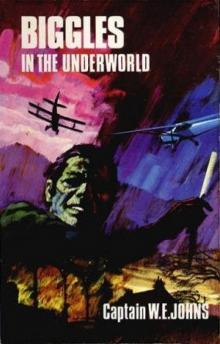 Biggles in the Underworld
Biggles in the Underworld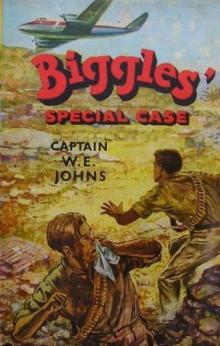 Biggles' Special Case
Biggles' Special Case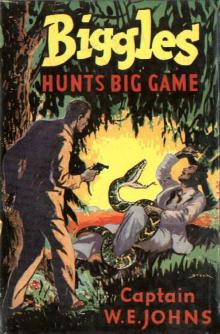 34 Biggles Hunts Big Game
34 Biggles Hunts Big Game 03 Now To The Stars
03 Now To The Stars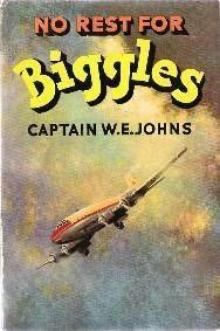 55 No Rest For Biggles
55 No Rest For Biggles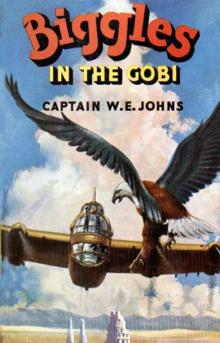 46 Biggles in the Gobi
46 Biggles in the Gobi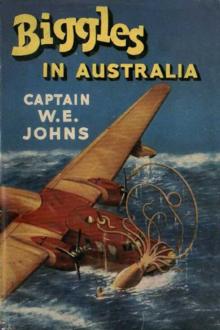 52 Biggles In Australia
52 Biggles In Australia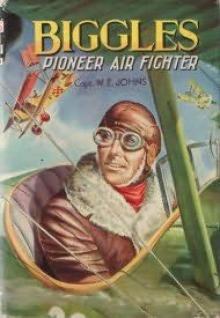 51 Biggles Pioneer Air Fighter
51 Biggles Pioneer Air Fighter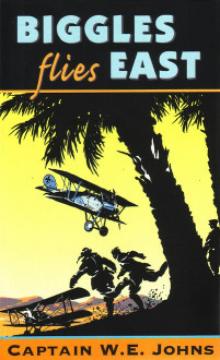 05 Biggles Flies East
05 Biggles Flies East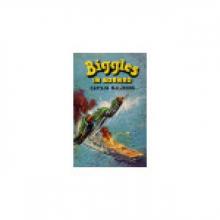 28 Biggles In Borneo
28 Biggles In Borneo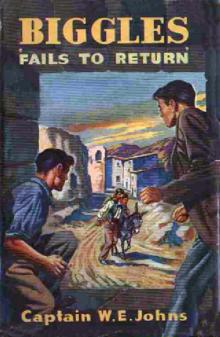 29 Biggles Fails to Return
29 Biggles Fails to Return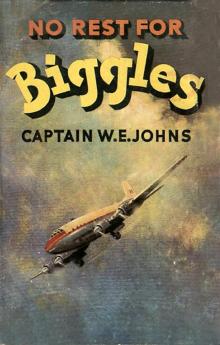 55 No Rest For Biggles (v2)
55 No Rest For Biggles (v2)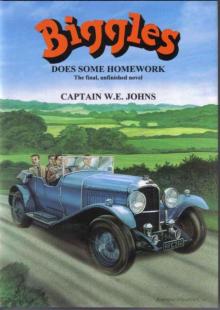 Biggles Does Some Homework
Biggles Does Some Homework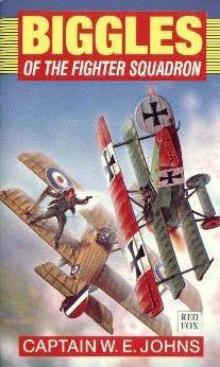 Biggles of the Camel Squadron
Biggles of the Camel Squadron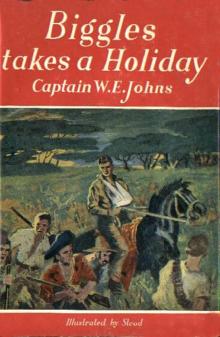 35 Biggles Takes A Holiday
35 Biggles Takes A Holiday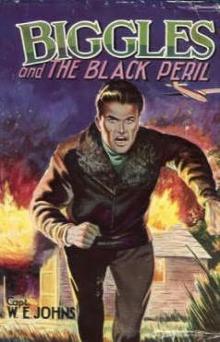 Biggles And The Black Peril (06)
Biggles And The Black Peril (06)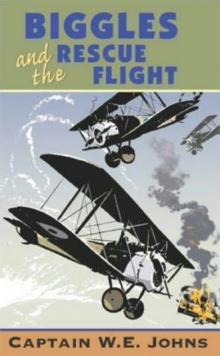 17 Biggles And The Rescue Flight
17 Biggles And The Rescue Flight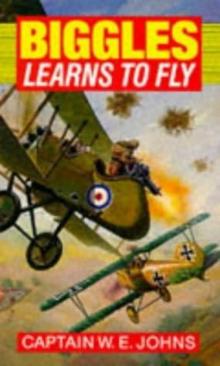 Biggles Learns To Fly
Biggles Learns To Fly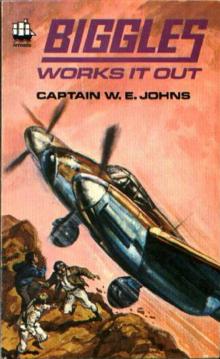 40 Biggles Works It Out
40 Biggles Works It Out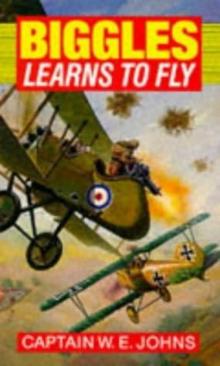 05 Biggles Learns To Fly
05 Biggles Learns To Fly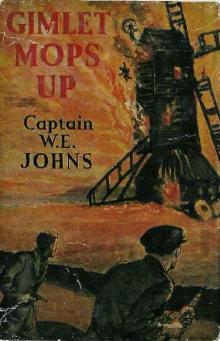 04 Gimlet Mops Up
04 Gimlet Mops Up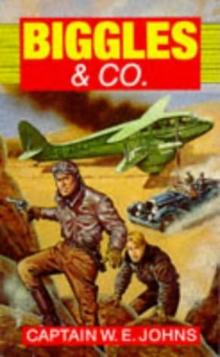 10 Biggles and Co
10 Biggles and Co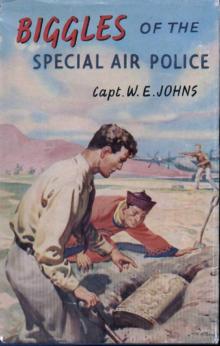 47 Biggles Of The Special Air Police
47 Biggles Of The Special Air Police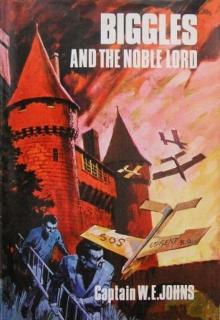 Biggles and the Noble Lord
Biggles and the Noble Lord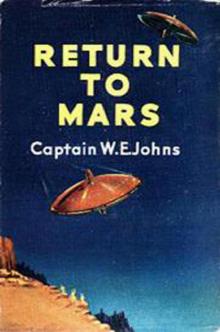 T2 Return To Mars
T2 Return To Mars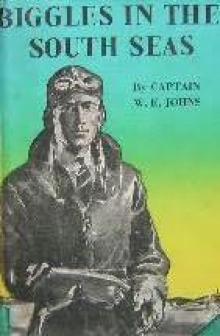 21 Biggles In the South Seas
21 Biggles In the South Seas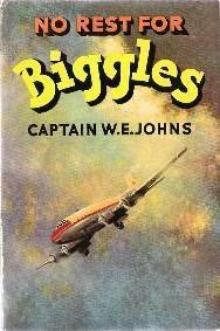 No Rest For Biggles
No Rest For Biggles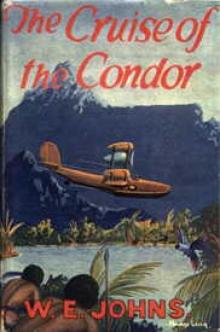 Biggles In The Cruise Of The Condor (02)
Biggles In The Cruise Of The Condor (02)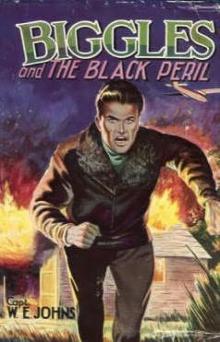 06 Biggles And The Black Peril
06 Biggles And The Black Peril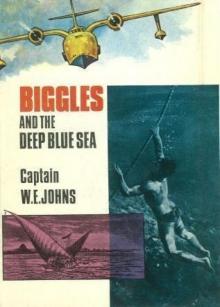 Biggles and the Deep Blue Sea
Biggles and the Deep Blue Sea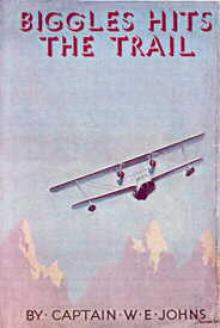 06 Biggles Hits The Trail
06 Biggles Hits The Trail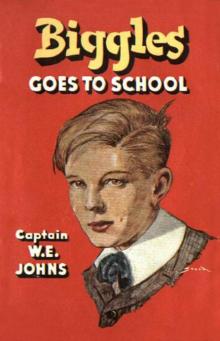 39 Biggles Goes To School
39 Biggles Goes To School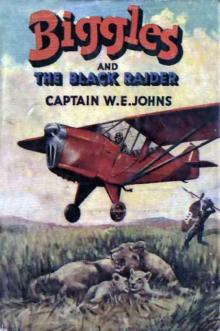 44 Biggles and the Black Raider
44 Biggles and the Black Raider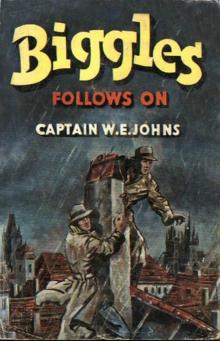 42 Biggles Follows On
42 Biggles Follows On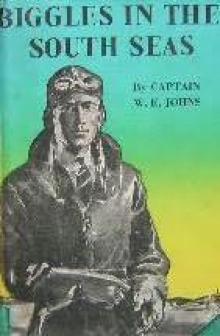 Biggles In the South Seas
Biggles In the South Seas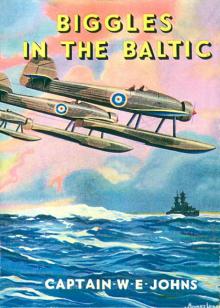 21 Biggles In The Baltic v3
21 Biggles In The Baltic v3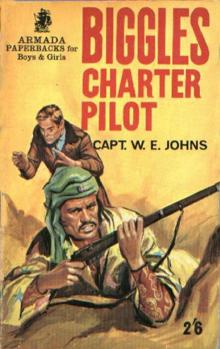 27 Biggles - Charter Pilot
27 Biggles - Charter Pilot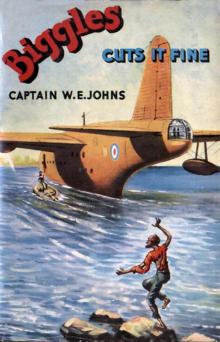 49 Biggles Cuts It Fine
49 Biggles Cuts It Fine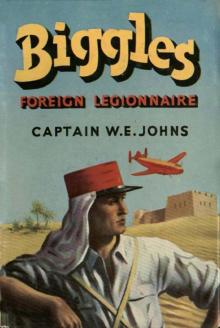 51 Biggles Foreign Legionaire
51 Biggles Foreign Legionaire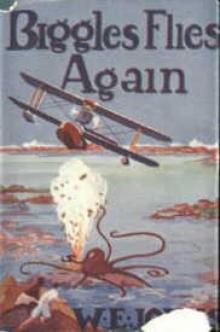 04 Biggles Flies Again
04 Biggles Flies Again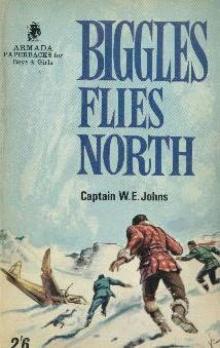 16 Biggles Flies North
16 Biggles Flies North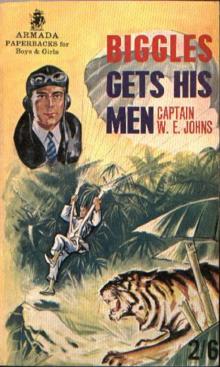 37 Biggles Gets His Men
37 Biggles Gets His Men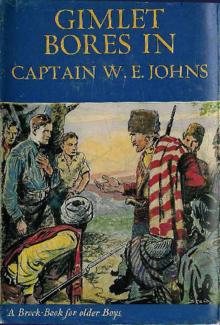 07 Gimlet Bores In
07 Gimlet Bores In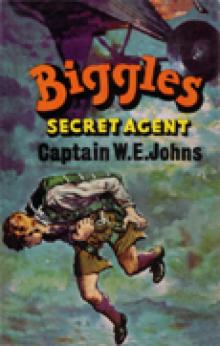 19 Biggles Secret Agent
19 Biggles Secret Agent 32 Biggles In The Orient
32 Biggles In The Orient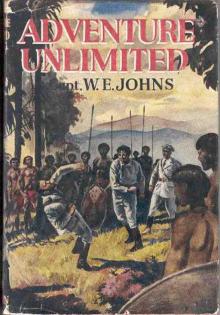 Adventure Unlimited
Adventure Unlimited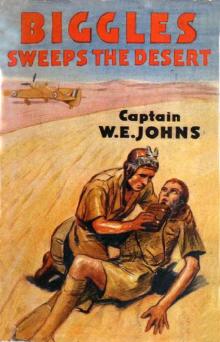 26 Biggles Sweeps The Desert
26 Biggles Sweeps The Desert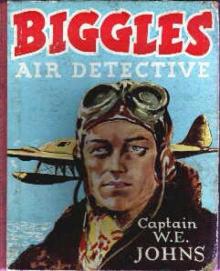 Biggles Air Detective (43)
Biggles Air Detective (43) 36 Biggles Breaks The Silence
36 Biggles Breaks The Silence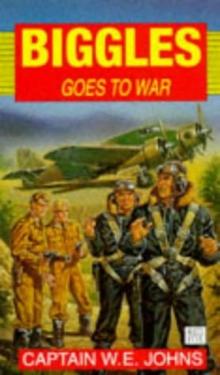 14 Biggles Goes To War
14 Biggles Goes To War 18 Biggles In Spain
18 Biggles In Spain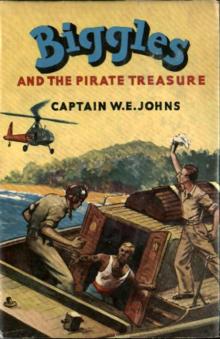 50 Biggles and the Pirate Treasure
50 Biggles and the Pirate Treasure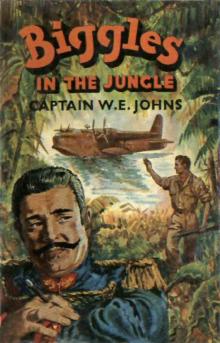 25 Biggles In The Jungle
25 Biggles In The Jungle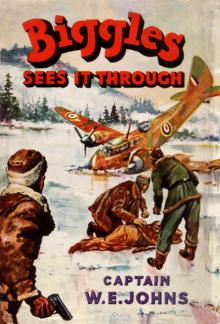 23 Biggles Sees It Through
23 Biggles Sees It Through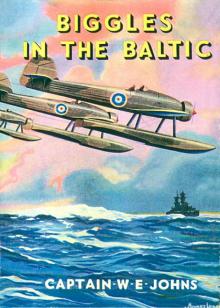 21 Biggles In The Baltic
21 Biggles In The Baltic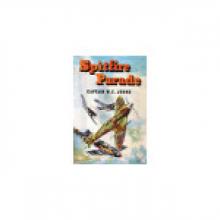 24 Spitfire Parade
24 Spitfire Parade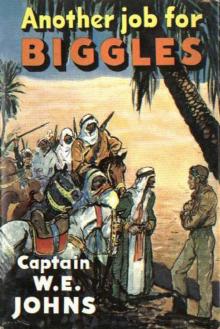 38 Another Job For Biggles
38 Another Job For Biggles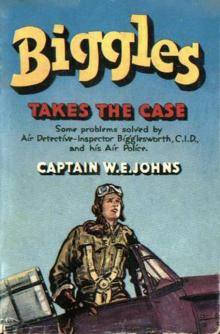 41 Biggles Takes The Case
41 Biggles Takes The Case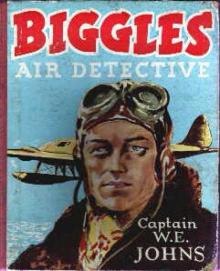 43 Biggles Air Detective
43 Biggles Air Detective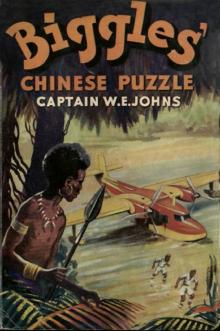 53 Biggles Chinese Puzzle
53 Biggles Chinese Puzzle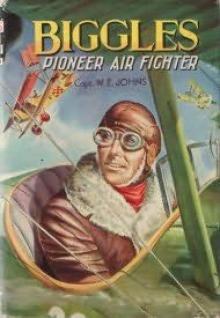 Biggles Pioneer Air Fighter (51)
Biggles Pioneer Air Fighter (51)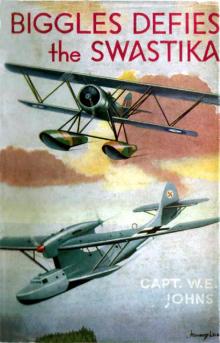 22 Biggles Defies The Swastika
22 Biggles Defies The Swastika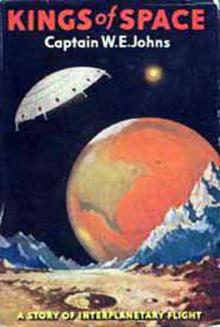 01 Kings Of Space
01 Kings Of Space